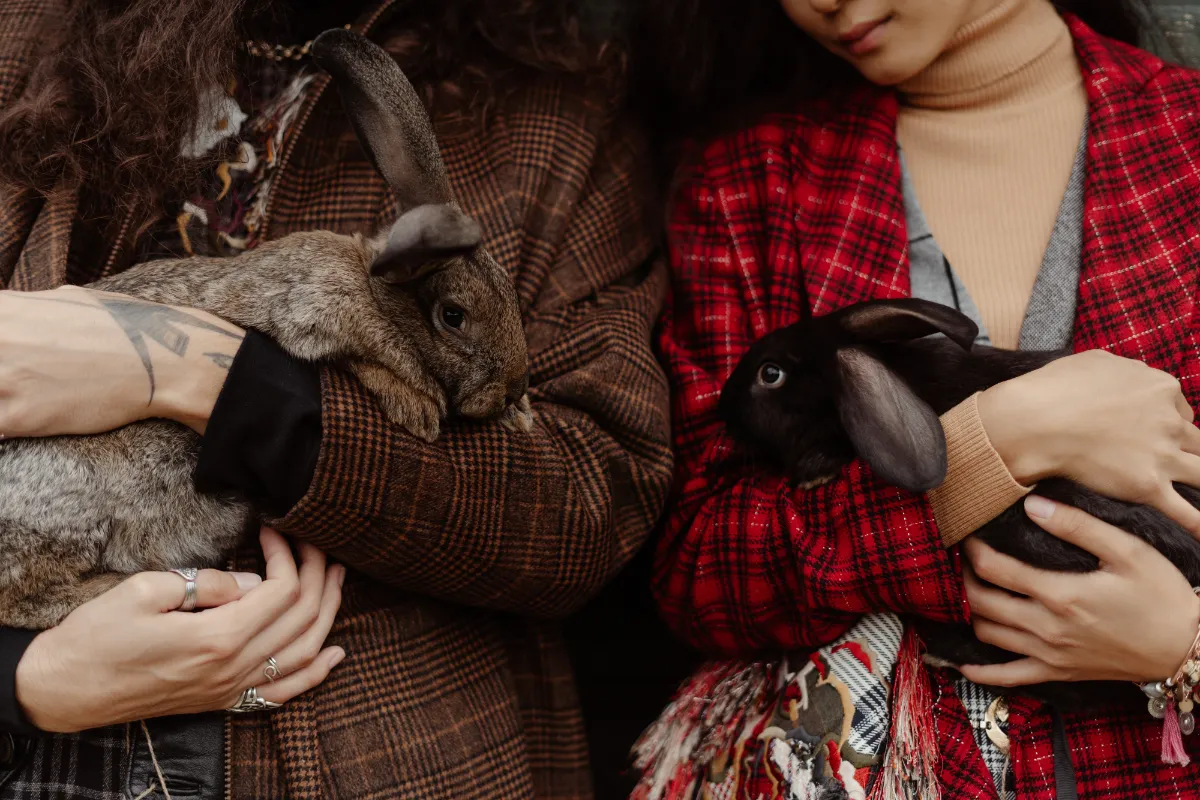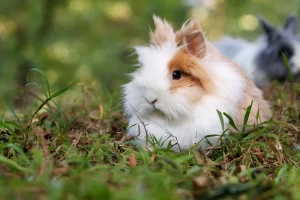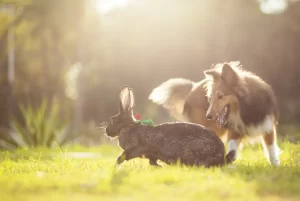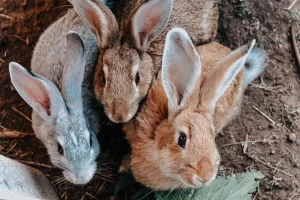Have you ever wondered why your rabbit follows you around?
It’s not just a random act – there are actually several reasons behind this behavior. One possible explanation is their natural instinct to form a bond with their primary caregiver, which is often you.
Rabbits are social animals, and by sticking close to you, they feel safe and secure. Additionally, they may be seeking attention, affection, or even mimicking your behavior.
Understanding why your rabbit follows you can help foster a stronger bond between you both.
In This Article
Key Takeaways
- Rabbits have a territorial nature and may follow their owners as a way to establish them as part of their territory.
- Bonding, trust, and emotional connection are important factors in a rabbit’s behavior of following their owner.
- Rabbits are highly intelligent animals that can form emotional connections with their human caretakers and learn to respond to commands and recognize their names.
- Curiosity, exploration, seeking security, and the need for attention, affection, and routine are other reasons why rabbits may follow their owners.
Behavioral Instincts
You should observe your rabbit’s behavioral instincts to understand why it follows you. Rabbits have instinctual patterns that drive their behavior, and one of those patterns is their territorial behavior.
In the wild, rabbits are territorial animals, marking their territory with scent glands and defending it from intruders. When a rabbit follows you, it may be exhibiting its territorial nature by establishing you as a part of its territory.
Bonding and Trust
When bonding with your rabbit, it’s important to establish trust through consistent interaction and positive reinforcement. Building rapport with your rabbit is crucial for a healthy and fulfilling relationship. Here are three key tips to help you in this process:
- Spend quality time with your rabbit every day. Regular interaction helps your rabbit become familiar with you and builds trust over time. This can include gentle petting, talking softly, or engaging in playtime activities.
- Pay attention to your rabbit’s body language. Rabbits communicate through subtle cues such as ear position, body posture, and tail movement. Understanding and responding to these signals will help you build a stronger bond and ensure your rabbit feels safe and comfortable in your presence.
- Use positive reinforcement. Reward your rabbit with treats, praise, or favorite toys when they exhibit desired behavior. This positive association will strengthen the bond between you and your rabbit and encourage them to trust you more.
By following these tips and being patient and consistent, you can establish a strong bond with your rabbit, based on trust and effective body language communication.
Social Hierarchy
Understanding the social hierarchy among rabbits can help you comprehend the dynamics of their interactions and behaviors.
Rabbits are social animals that live in groups and establish dominance dynamics within their group. Group dynamics in rabbits are shaped by the need for resources and ensuring the survival of the group.
Dominance dynamics play a crucial role in establishing leadership and maintaining order within the group. Dominant rabbits exhibit behaviors such as asserting their dominance through displays of aggression or marking their territory.
Subordinate rabbits, on the other hand, exhibit submissive behaviors such as avoiding eye contact, crouching, or grooming the dominant rabbit.
Curiosity and Exploration
Go ahead and let your rabbit’s curiosity guide its exploration of new environments and experiences. Rabbits have an inquisitive nature, which drives them to investigate their surroundings and interact with their owners. Their natural curiosity is a result of their survival instincts and their need to find food, shelter, and mates.
Here are three reasons why your rabbit may be following you:
- Bonding: Rabbits are social animals and they form strong bonds with their owners. They may follow you as a way to strengthen the bond and seek companionship.
- Safety: Rabbits are prey animals, and by following you, they feel safer and more protected. They trust you to keep them out of harm’s way.
- Territory: Rabbits can exhibit territorial behavior, and by following you, they’re marking you as part of their territory. This behavior is a display of trust and ownership.
Need for Attention and Affection
You can show your rabbit affection by petting it gently and spending quality time with it.
Rabbits are social animals that can develop strong emotional attachments to their owners. This emotional attachment is often the result of a nurturing environment where the rabbit feels safe and loved.
When a rabbit becomes emotionally attached to its owner, it may exhibit behaviors such as following you around the house. This behavior can be a sign of separation anxiety, as rabbits are highly sensitive creatures that can become distressed when separated from their trusted caregiver.
To alleviate separation anxiety and strengthen the emotional bond with your rabbit, it’s important to provide them with a consistent routine, plenty of social interaction, and mental stimulation.
Spending time with your rabbit, engaging in activities such as gentle petting, grooming, and play, can help foster a deep sense of affection and security between you and your furry friend.
Seeking Security and Protection
Feeling safe and protected is essential for your rabbit’s well-being and happiness. Rabbits are social animals that crave comfort and companionship, and their territorial instincts play a significant role in seeking security and protection.
Here are three reasons why your rabbit may exhibit the behavior of following you:
- Bonding: Rabbits are highly social and form strong bonds with their owners. Following you around shows their desire for companionship and a sense of security.
- Safety: By sticking close to you, rabbits feel protected from potential dangers. They trust your presence to ward off any potential threats.
- Territory: Rabbits are territorial animals and may follow you to mark you and your surroundings with their scent. This behavior helps them establish ownership and feel more secure in their environment.
Understanding these instincts can help you provide a nurturing and secure environment for your furry friend.
Mimicking Human Behavior
Have you ever noticed how rabbits mimic human behavior? It may seem surprising, but rabbits are capable of forming an emotional connection with their human caretakers and learning behavior through observation.
This ability to mimic human behavior is rooted in their social nature and their desire for companionship. Rabbits are highly intelligent animals that can pick up on cues and imitate certain actions. They observe and learn from their surroundings, including the behavior of their human companions.
This learning behavior isn’t only limited to simple actions like hopping or grooming, but can also extend to more complex behaviors such as recognizing their names or responding to commands.
Habituation and Routine
An important aspect of maintaining a happy and healthy rabbit is establishing a consistent routine for feeding and socializing. Rabbits are creatures of habit and thrive on routine. Habituation in rabbits refers to their ability to adapt to a regular schedule, which has a significant impact on their overall behavior and well-being.
Here are three key effects of routine on rabbits’ behavior:
- Reduced stress: By following a predictable routine, rabbits feel more secure and less anxious. They become accustomed to the daily activities, such as feeding and playtime, which creates a sense of safety and comfort.
- Increased trust: When rabbits know what to expect, they develop a trusting bond with their caregivers. Consistency in feeding and socializing helps them build a positive association with humans, leading to a stronger relationship.
- Improved health: A consistent routine ensures that rabbits receive balanced nutrition and exercise regularly. This promotes their physical health and prevents behavioral problems caused by boredom or inactivity.
Frequently Asked Questions
How Do I Train My Rabbit to Follow Me?
To train your rabbit to follow you, use rabbit training techniques and focus on building trust with your furry friend. By using positive reinforcement and rewards, your rabbit will learn to follow you willingly.
Can Rabbits Recognize Their Owners?
Rabbits can recognize their owners due to their keen sense of smell and visual recognition. This recognition is a result of the strong bond you have built with your rabbit through positive interactions and consistent care.
Why Does My Rabbit Only Follow Me and Not Other Family Members?
Understanding the reasons behind a rabbit’s preference for one family member over others is fascinating! Exploring the impact of a rabbit’s bond with its primary caregiver on its behavior can provide valuable insights.
Is It Safe for My Rabbit to Follow Me Outside?
It’s important to consider the potential dangers of allowing your rabbit to roam outside unsupervised. Create a safe and secure outdoor environment for them to explore, ensuring their well-being and minimizing risks.
What Should I Do if My Rabbit Becomes Too Clingy and Follows Me Everywhere?
If your rabbit becomes too clingy and follows you everywhere, it might be dealing with separation anxiety. Setting boundaries is crucial. Gradually decrease the amount of time you spend together to help your rabbit become more independent.





